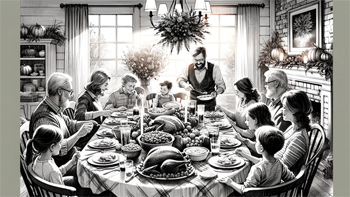 Thanksgiving Day in the United States
Thanksgiving Day in the United States


Thanksgiving Day in the United States is a time-honored tradition, celebrated on the fourth Thursday of November each year. This cherished holiday is deeply rooted in American culture and history, symbolizing gratitude, family, and the harvest season. From its historical origins to contemporary celebrations, Thanksgiving Day holds a special place in the hearts of Americans.
The Historical Origins of Thanksgiving
The origins of Thanksgiving Day date back to the early 17th century when English Pilgrims at Plymouth, Massachusetts, held a feast to celebrate a bountiful harvest. This 1621 event, often regarded as America’s “First Thanksgiving,” was attended by both the Pilgrims and Native Americans. It symbolized cooperation and gratitude for the successful harvest and the help provided by the Native Americans in planting crops and surviving in the new land.
The Evolution of Thanksgiving as a National Holiday
While various forms of Thanksgiving celebrations occurred sporadically throughout American history, it wasn’t until the Civil War era that President Abraham Lincoln proclaimed a national Thanksgiving Day in 1863, amidst the nation's turmoil. He designated it as a time to express gratitude for the blessings of the year, particularly the Union Army’s victory at Gettysburg. Since then, Thanksgiving has been observed annually as a national holiday in the United States.
Thanksgiving Traditions and Customs
Thanksgiving Day is synonymous with several time-honored traditions. The most iconic is the Thanksgiving feast, typically including roasted turkey, stuffing, mashed potatoes, cranberry sauce, and pumpkin pie. This sumptuous meal draws from the historic harvest celebration and remains central to the Thanksgiving Day experience.
Another significant tradition is the Macy’s Thanksgiving Day Parade in New York City. Beginning in 1924, this parade is famous for its giant helium balloons, floats, marching bands, and performances, drawing millions of spectators both on the streets and via television broadcasts.
Family Gatherings and Gratitude
At the heart of Thanksgiving is the gathering of family and friends. It is a time for Americans to come together, share a meal, and express gratitude for life's blessings. This aspect of Thanksgiving underscores the importance of family bonds and appreciating the simple joys of life.
Football and Thanksgiving
Watching football on Thanksgiving Day is a tradition for many Americans. The National Football League (NFL) has been hosting Thanksgiving games since its inception in 1920. These football games have become an integral part of the holiday's modern celebrations.
Thanksgiving and Community Service
Thanksgiving is also a day for giving back to the community. Many people volunteer at soup kitchens, food banks, and homeless shelters, embodying the spirit of gratitude and sharing. This tradition of community service reflects the holiday’s deeper significance of compassion and caring for others.
Black Friday and the Holiday Shopping Season
The day after Thanksgiving, known as Black Friday, unofficially marks the beginning of the Christmas shopping season. Retailers offer significant sales, drawing large crowds and signaling the start of holiday shopping. Black Friday has become an extension of the Thanksgiving holiday for many Americans, blending traditions with modern consumer culture.
Thanksgiving in Contemporary Society
In contemporary society, Thanksgiving Day has retained its essence as a time for gratitude and family reunions, while also evolving with modern traditions. It remains a day for Americans to pause from the daily hustle, reflect on their blessings, and enjoy the warmth of family and community. Thanksgiving continues to be a day that unites Americans from all walks of life in a shared celebration of gratefulness and togetherness.
Thanksgiving Day in the United States is more than just a holiday; it is a reflection of American history, culture, and values. It represents a time to be thankful, a moment to pause and appreciate the abundance of life, and an opportunity to strengthen family ties and community bonds. As Americans gather around the dinner table each November, they partake in a tradition that transcends generations, reaffirming the timeless values of gratitude, family, and unity.